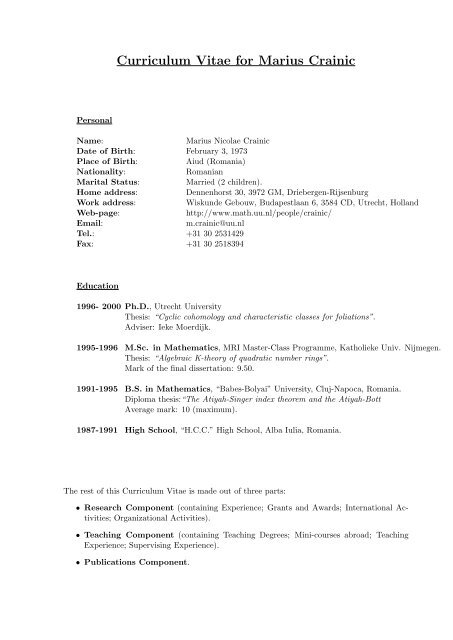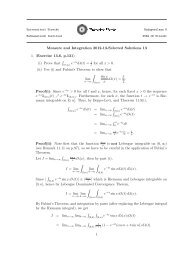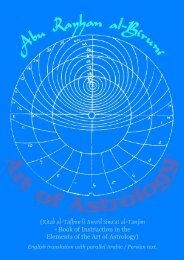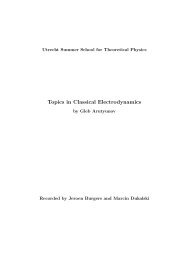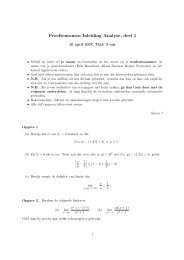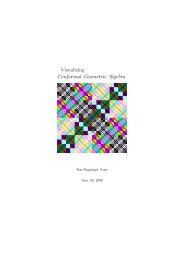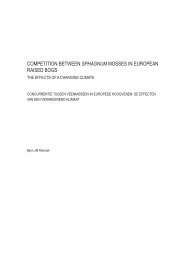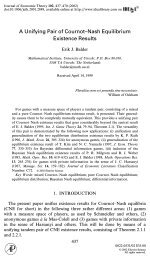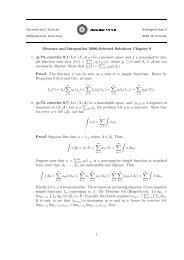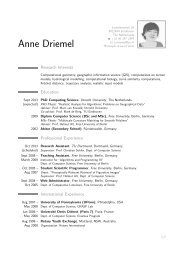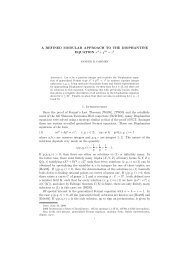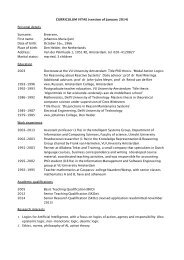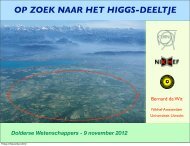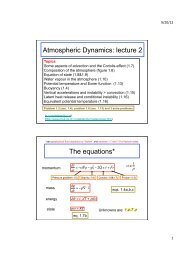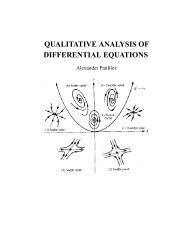Curriculum Vitae for Marius Crainic
Curriculum Vitae for Marius Crainic
Curriculum Vitae for Marius Crainic
You also want an ePaper? Increase the reach of your titles
YUMPU automatically turns print PDFs into web optimized ePapers that Google loves.
<strong>Curriculum</strong> <strong>Vitae</strong> <strong>for</strong> <strong>Marius</strong> <strong>Crainic</strong><br />
Personal<br />
Name:<br />
<strong>Marius</strong> Nicolae <strong>Crainic</strong><br />
Date of Birth: February 3, 1973<br />
Place of Birth:<br />
Aiud (Romania)<br />
Nationality:<br />
Romanian<br />
Marital Status:<br />
Married (2 children).<br />
Home address:<br />
Dennenhorst 30, 3972 GM, Driebergen-Rijsenburg<br />
Work address:<br />
Wiskunde Gebouw, Budapestlaan 6, 3584 CD, Utrecht, Holland<br />
Web-page:<br />
http://www.math.uu.nl/people/crainic/<br />
Email:<br />
m.crainic@uu.nl<br />
Tel.: +31 30 2531429<br />
Fax: +31 30 2518394<br />
Education<br />
1996- 2000 Ph.D., Utrecht University<br />
Thesis: “Cyclic cohomology and characteristic classes <strong>for</strong> foliations”.<br />
Adviser: Ieke Moerdijk.<br />
1995-1996 M.Sc. in Mathematics, MRI Master-Class Programme, Katholieke Univ. Nijmegen.<br />
Thesis: “Algebraic K-theory of quadratic number rings”.<br />
Mark of the final dissertation: 9.50.<br />
1991-1995 B.S. in Mathematics, “Babes-Bolyai” University, Cluj-Napoca, Romania.<br />
Diploma thesis:“The Atiyah-Singer index theorem and the Atiyah-Bott<br />
Average mark: 10 (maximum).<br />
1987-1991 High School, “H.C.C.” High School, Alba Iulia, Romania.<br />
The rest of this <strong>Curriculum</strong> <strong>Vitae</strong> is made out of three parts:<br />
• Research Component (containing Experience; Grants and Awards; International Activities;<br />
Organizational Activities).<br />
• Teaching Component (containing Teaching Degrees; Mini-courses abroad; Teaching<br />
Experience; Supervising Experience).<br />
• Publications Component.
<strong>Curriculum</strong> <strong>Vitae</strong> <strong>for</strong> <strong>Marius</strong> <strong>Crainic</strong><br />
I. Research Component:<br />
Summary:<br />
• Experience<br />
• Grants and Awards<br />
• Talks in (international) conferences<br />
• Organizational activities<br />
• The broad research interests of <strong>Marius</strong> <strong>Crainic</strong>: Geometry and Topology<br />
3
Experience<br />
2007- UHD , Utrecht University, The Netherlands.<br />
2002-2007 UD , Utrecht University, The Netherlands.<br />
2002- 2007 Research Fellow of the Dutch Royal Academy of Sciences.<br />
Febr 2007<br />
May 2003<br />
Invited Professor, Institute Henri Poincare, Paris, France.<br />
Invited Professor, University of Clairmont-Ferrant, France.<br />
2001- 2002 Miller Research Fellow, University of Cali<strong>for</strong>nia at Berkeley, USA.<br />
2000- 2001 Post Doc position, Utrecht University, The Netherlands.<br />
1999 6 months visiting position, Universite Paris 6, France.<br />
1996- 2000 Ph.D. Research, Utrecht University.<br />
5
Grants and Awards 1<br />
2011-2016 ERC Starting Grant “New Advances through the boundaries of Poisson Geometry”.<br />
This project funds several PhD and PostDoc positions and is carried out at UU.<br />
The support <strong>for</strong> the project is 1.1 mil. euro.<br />
2011-2016 NWO Vrije Competitie project “Flexibility and Rigidity of Geometric Structures”.<br />
This project funds a PostDoc position (3 years) and is carried out at UU.<br />
The support <strong>for</strong> the project is 200 k euro.<br />
2009-2013 NWO Vrije Competitie project “Geometry of PDE’s and Poisson structures”.<br />
This project funds a PostDoc position (3 years) and is carried out at UU.<br />
The support <strong>for</strong> the project is 200 k euro.<br />
2009 The SKOz degree (Senior Research Qualification), Utrecht University.<br />
2008 Andre Lichnerowicz Prize in Poisson Geometry<br />
Lausanne, July 2008.<br />
2007-2012 NWO Vidi project “Poisson Topology”.<br />
This project funds a PhD position (4 years), a PostDoc position (3 years),<br />
and part of my salary (about 2/3) and is carried out at Utrecht University.<br />
The support <strong>for</strong> the project is 600 k euro.<br />
2004-2008 NWO Open Competitie project “Symmetries and De<strong>for</strong>mations in Geometry”.<br />
This project funded a PhD position (4 years) + a PostDoc position (3 years) at UU.<br />
The support <strong>for</strong> the project is 352 k euro.<br />
2002- 2007 KNAW Research Fellowship.<br />
The grant was awarded <strong>for</strong> 3 years, and then prolonged <strong>for</strong> another 2.<br />
The grant supported my research and was carried out at Utrecht University.<br />
The support <strong>for</strong> the project is around 350 k euro.<br />
2001-2004 Miller Research Fellowship (interrupted half way to start the KNAW position).<br />
The grant supported my research position at UC Berkeley. Applications <strong>for</strong> the grant<br />
are only by invitation and the selection is from all fields in science.<br />
1996-2000 NWO PhD Fellowship, Utrecht University.<br />
1995-1996 Master Class Fellowship, Mathematical Research Institute, The Netherlands.<br />
1998-1991 Olympiads: various awards at national and international“Olympiads” such as:<br />
- International Mathematics Olympiad, Beijing, 1990: 3 rd prize.<br />
- Balkan Mathematics Olympiad: 1 st prize in 1990 and 1991.<br />
- National Mathematics Olympiad (Romania): 1 st prize in 1991; 2 nd prize in 1990.<br />
1 NWO= The Dutch National Science Foundation; KNAW= The Dutch Royal Academy of Arts and Sciences;<br />
MRI= The Dutch Mathematical Research Institute; Miller: refers to the Miller Foundation <strong>for</strong> Fundamental<br />
Research in Sciences, at UC Berkeley<br />
7
Talks in (international) conferences<br />
• Oberwolfach meetings (Germany): several participations/talks given at the workshops<br />
organized at Mathematisches Forschungsinstitut Oberwolfach where the participation was<br />
by invitation only:<br />
- “Noncommutative Geometry”, September 2011.<br />
- “Poisson Geometry and Applications”, April-May 2007.<br />
- “Quantization of Poisson spaces with singularities”, January 2003.<br />
- “Nichtkommutative Geometrie”, March 2002.<br />
- “Noncommutative Geometry”, October 2001.<br />
- “Nichtkommutative Geometrie”, March 2000.<br />
- “Nichtkommutative Geometrie”, August 1998.<br />
• Erwin Schrodinger Institute <strong>for</strong> Mathematical Physics (Viena): invited to participate<br />
to various programs held at ESI and give talks in the related conferences, such<br />
as:<br />
- invited to the program “Higher structures in Mathematics and Physics”, October<br />
2010.<br />
- invited to the workshop “Poisson Geometry and Sigma-models”, August 2007.<br />
- invited to the program “Poisson sigma-models, Lie algebroids, de<strong>for</strong>mations and<br />
higher analogues”, 2007.<br />
- invited <strong>for</strong> the program “Gerbes, Groupoids, and Quantum Field Theory”, May 2006.<br />
- invited <strong>for</strong> the program “Moment maps and Poisson geometry”, August-November<br />
2003.<br />
- invited to the program “Aspects of Foliation Theory in Geometry, Topology and<br />
Physics”, September 2002.<br />
• Poisson conferences: invited to speak in the regular biennial conference in Poisson<br />
geometry:<br />
- “Poisson Geometry in Mathematics and Physics”, IMPA, Rio de Janeiro, July 2010.<br />
- “Poisson Geometry in Mathematics and Physics”, Bernoulli Center, Lausanne, Switzerland,<br />
July 7-11, 2008.<br />
- “Poisson geometry in mathematics and physics”, Tokyo, June 2006.<br />
- “Poisson 2004”, Luxembourg, June 2004,<br />
- “Poisson 2002”, Lisbon, September 2002.<br />
• Higher Structures conferences: invited to speak in the regular conferences ion ”higher<br />
structures”:<br />
- “Higher structures”, Gottingen, November, 2011.<br />
- “Higher structures in Mathematics and Physics”, Viena, October 2010.<br />
- “Higher Structures in Mathematics and Physics”, Zurich, November 2009.<br />
• MSRI (Berkeley):<br />
Berkeley:<br />
invited to speak in various conferences organized at the MSRI at<br />
9
- “Symplectic geometry, noncommutative geometry and physics”, 2010.<br />
- “Noncommutative Geometry and quantization”, 2001.<br />
• Other conferences: invited to speak in various other conferences such as:<br />
- “Poisson Geometry and Applications”, Figueira da Foz, June 2011.<br />
- “Quantization of Singular Spaces”, Aarhus, December 2010.<br />
- “XVIII International Fall Workshop on Geometry and Physics”, Centro de Ciencias<br />
de Benasque Pedro Pascual, September 2009.<br />
- “FNRS contact group in Differential Geometry”, Han-sur-Lesse, Belgium, November<br />
2008.<br />
- “Symplectic Geometry with Algebraic Techniques” (GESTA 2008), CRM Barcelona,<br />
May 2008.<br />
- “Lie Algebroids and Lie Groupoids in Differential Geometry”, Sheffield, 2007.<br />
- “Conference on Poisson Geometry”, the the Abdus Salam International Centre <strong>for</strong><br />
Theoretical Physics, Trieste, July 2005.<br />
- “Au-dela des algebroides de Lie”, École Polytechnique, 2004.<br />
- “Poisson Geometry, De<strong>for</strong>mation Quantisation and Group Representations”, Brussels,<br />
June 2003.<br />
- “Groupoid-fest 2002”, Reno, Nevada, November 2002.<br />
- “Quantization, de<strong>for</strong>mations, and new homological and categorical methods in mathematical<br />
physics”, LMS meeting, Manchester, 2001.<br />
- “Symplectic Geometry and Microlocal Analysis”, Penn State University, 1999.<br />
• Other visits, talks and minicourses: several other visits abroad, such as: University<br />
of Geneva (October 2007, invited by A. Alekseev and A. Heafliger), IHP Paris (January<br />
2007), CIRM Luminy (September 2007), Instituto Superior Tecnico, Lisbon, Portugal<br />
(several visits in 2001, 2005, 2006, 2007, invited by R.L. Fernandes), Universite Paul<br />
Sabatier (Toulouse, 2002), University of Muenster (2002), University of Cali<strong>for</strong>nia at Los<br />
Angeles (UCLA, 2001), etc. In all cases, I was invited to give talks or mini-courses (<strong>for</strong><br />
the detailed list of mini-courses, see the ”teaching component” of the CV).<br />
• Journals: editor <strong>for</strong> the journals Indagationes and Mathematica; also a referee <strong>for</strong> various<br />
journals such as Journal of Differential Geometry, Inventiones, Advances in Mathematics,<br />
Duke Mathematical Journal, J. Reine Angew. Math., American Journal of Mathematics,<br />
Journal of Symplectic Geometry, Pacific Journal of Mathematics, Annales de l’institut<br />
Fourier, K-Theory etc.<br />
• Berkeley activities: During my stay at UC Berkeley as a Miller Research Fellow, I<br />
participated in various activities in the region (MSRI, Stand<strong>for</strong>d, UCLA) andas well as<br />
in the weekly interdisciplinary colloquium organized by the Miller Foundation <strong>for</strong> Basic<br />
Research in Science, which brings together scientists from the exact sciences.<br />
10
Organizational activities<br />
• Poisson 2012: I am the chair of the organizing committee <strong>for</strong> the conference and summer<br />
school “Poisson 2012”, where we expect over 200 participants. Please see<br />
www.math.uu.nl/poisson2012<br />
• Scientific organizer: organized various national or international activities such as:<br />
- The GQT conference “Conference Geometry and Quantum Theory” (together with G.<br />
Heckman and J. Heinlot), marking the end of the GQT cluster (June 2008, Nijmegen).<br />
- The meeting “TopoLogical Workshop”, obtaining the financial support from the MRI<br />
and NWO (April 2008, at the conference center Bergse Bos in Driebergen).<br />
- The workshop “Alan’s day” , in relation with the honorary doctorate awarded by the<br />
University of Utrecht to Alan Weinstein (March 2003, Utrecht).<br />
- Co-organizer of the Oberwolfach meeting “Poisson Geometry and applications” (May<br />
2007) .<br />
- Member of the Scientific Committee <strong>for</strong> the conference “Poisson 2010”.<br />
- The scientific organizer of the 2006/2007 Master Class entitled “Symplectic geometry<br />
and Beyond”.<br />
- Involved in the scientific organization of the 2003/2004 Master Class entitled “Noncommutative<br />
geometry”.<br />
- Organized/co-organized various local and national seminars on Topology, Poisson Geometry,<br />
Noncommutative Geometry, Mathematical Physics. E.g., in 2007: Floer Homology<br />
Seminar (together with D. Martinez Torres), in September 2008 I started the<br />
“Friday Fish Seminar” (see http://www.math.uu.nl/people/crainic/Poisson/index.html),<br />
etc etc (2000- present).<br />
• Olympiad (2009- ) Various tasks related to the Dutch Mathematical Olympiads <strong>for</strong> highschool<br />
students. I became more and more interested and involved in such activities. I<br />
have several ideas and plans in this direction, such as establishing long-term connections<br />
between universities and high-schools, creating new opportunities <strong>for</strong> interactions between<br />
the best high-school teachers, at the national level, etc etc. In particular, we have introduced<br />
the ”Tweede Ronde”, which is a regional round be<strong>for</strong>e the ”final”, together with<br />
“training sessions” that are organized by various universities throughout the country. In<br />
this direction, I am in coordinating all the activities <strong>for</strong> the Utrecht region, such as the<br />
organization each year of the regional round <strong>for</strong> Utrecht. In July 2011, I was one of the<br />
coordinators at the IMO (international Mathematics Olympiad) that took place in The<br />
Netherlands.<br />
• Master Class (2004- 2009): Coordinator of the “Master Class” programme of the Dutch<br />
Mathematical Research Institute.<br />
The MRI is founded by the universities of Groningen, Nijmegen, Twente and Utrecht. The<br />
Master Class programme aimed at attracting bright students from abroad to come and<br />
study in the Netherlands, to stimulate the interaction between the students (<strong>for</strong>eign as<br />
well as Dutch), and to offer each year a package of courses that cover an important field<br />
of Mathematics and Mathematical Physics and brings the students to the level of starting<br />
with PhD research.<br />
The role of the coordinator is to supervise the ongoing master classes (schedule, various<br />
11
activities, final ceremony, etc), to attract new MC proposals, to advertise the program, to<br />
select the students etc. Master Classes coordinated:<br />
– Arithmetic Geometry and Noncommutative Geometry (2009-2010)<br />
– Numerical Bifurcation Analysis of Dynamical Systems (2009-2010)<br />
– Calabi-Yau geometry (2008-2009)<br />
– Quantum groups, affine Lie algebras and applications (2007-2008)<br />
– Symplectic geometry and Beyond (2006-2007) (Also Scientific organizer).<br />
– Logic (2006-2007).<br />
– Finite and infinite dimensional dynamical systems (2005-2006).<br />
– Stochastics in Molecular Biology and Genetics (2004-2005).<br />
There are several main achievements in this direction:<br />
– During this period, the Master Class obtained the financial support of the various<br />
dutch clusters (most notably, the GQT cluster supports each year about 8 students,<br />
<strong>for</strong> a period of 6 years). The survival of the Master Class depends on finding such<br />
financial support.<br />
– The Master Class program made it into the academic news (when, at the opening of<br />
the GQT cluster, the Ministry of Education spoke about the importance of the MC<br />
and handed out to the students their diplomas).<br />
– As a step in advertising the programme, I made a new data-base (up-to-date and<br />
complete) containing the main Mathematics Departments around the world and their<br />
addresses. This data base is nowadays used by the entire department <strong>for</strong> advertising<br />
various other programs.<br />
– I started another data-base, containing the names and the whereabouts of the <strong>for</strong>mer<br />
Master Class students. This in<strong>for</strong>mation was already used by NWO in some of their<br />
public presentations (serving as an interesting analysis from various points of view:<br />
the role of <strong>for</strong>eign students coming and studying in Holland, the extremely varied<br />
career paths taken by them).<br />
• Stafcolloquium (UU) (2004-2008): Organizer of the general (weekly) Stafcolloquium<br />
of the Mathematics Department, Utrecht University, together with G. Cornelissen (until<br />
2006/2007) and with R. Bisseling (remaining period). The duties include the process of<br />
finding and inviting speakers, managing the Stafcolloquium funds, etc.<br />
• Memberships, committees:<br />
- Member of the national research commission (“Commissie Onderzoek”) of the PWN<br />
(since 2010).<br />
- Editor <strong>for</strong> the journal Indagationes (since 2010).<br />
- Editor <strong>for</strong> the journal Mathematica (since 2009)<br />
- Part of various selection committees, such as the one <strong>for</strong> the UD position at UU<br />
associated to the GQT cluster (2008), or the Vrije Competitie selection committees<br />
<strong>for</strong> 2010 and 2012.<br />
12
The broad research interests of <strong>Marius</strong> <strong>Crainic</strong>: Geometry and Topology<br />
Geometry is the oldest branch of mathematics. It is concerned with questions of shape, size,<br />
relative position of figures, and the properties of space. Its empirical origins were put into an<br />
axiomatic <strong>for</strong>m by Euclid (3rd century BC ), and the resulting Euclidean geometry has been<br />
standard <strong>for</strong> many centuries. Questions from astronomy, on the position and the movement<br />
of stars and planets, served as an important source of geometric problems during one and a<br />
half millennia. The discovery of coordinates by Ren Descartes played an essential role in the<br />
development of algebra (geometric figures, such as plane curves, could now be represented by<br />
equations) and, later on, in the emergence of infinitesimal calculus in (17th century). For a<br />
long time, there was no clear distinction between physical space and geometrical space; starting<br />
with the discovery of non-Euclidean geometry (19th century) the notion of “geometric space”<br />
has undergone a radical trans<strong>for</strong>mation (up to the point that even notions like “space”, “point”,<br />
“line” etc lost their original intuitive content). The central question became: which “abstract”<br />
geometrical space best fits (models) the physical space.<br />
Differential Geometry: Contemporary geometry considers manifolds- which are spaces that<br />
approximately resemble the familiar Euclidean space only at small scales (e.g. spheres). On<br />
these, one considers various “geometric structures”, depending on the aspects one is interested<br />
in. Differential Geometry is the resulting study of manifolds endowed with such geometric<br />
structures. For instance, to talk about “lengths”, the geometric structure that one has to<br />
consider is known under the name of “Riemannian metric” and the resulting field is known as<br />
“Riemannian Geometry” (a subfield of Differential Geometry). Differential geometry is also the<br />
language in which Einstein’s general theory of relativity is expressed: the universe appears as a<br />
smooth manifold equipped with a pseudo-Riemannian metric, which describes the curvature of<br />
space-time; understanding this curvature is essential <strong>for</strong> the positioning of satellites into orbit<br />
around the earth. One may even say that each physical theory comes with its own (subfield<br />
of) geometry. Another example comes from the Hamiltonian <strong>for</strong>mulation of classical mechanics,<br />
which gives rise to Poisson Geometry. In this theory, the objects that are studied are manifolds<br />
endowed with the geometric structures that allows one to write down Hamilton’s equations<br />
(“Poisson structures”).<br />
We also have to mention here that role played by symmetries in geometry. When looking at most<br />
of Eschers drawings, one realizes the presence of symmetry, which allows one to reconstruct the<br />
complete drawing from a smaller part of it. More generally, one of the central ideas in geometry<br />
is to understand (and even classify) the geometric objects via their ”symmetries”; this originates<br />
in Klein’s Erlanger Programm (1872). The precise mathematical notion that allows us to talk<br />
about symmetries in Differential Geometry is that of “Lie group”. Its birth goes back to the<br />
work of Sophus Lie on symmetries of differential equations (at the end of the nineteenth century)<br />
and that of Elie Cartan on symmetries of geometric structures (at the beginning of the twentieth<br />
century). Nowadays one talks about “Lie Theory”, which pervades modern mathematics and<br />
theoretical physics.<br />
Topology: A close relative of Geometry is the field of “Topology”, which is concerned with<br />
properties that are preserved under continuous de<strong>for</strong>mations of objects, such as de<strong>for</strong>mations<br />
that involve stretching, but no tearing or gluing. For instance, a circle and an ellipsis, although<br />
geometrically distinct, have the same topology: one can be obtained from the other by a continuous<br />
trans<strong>for</strong>mation- realise the ellipsis as the shadow of a non-horizontal circle and consider the<br />
trans<strong>for</strong>mation along the rays of light. Similarly, spheres and convex polyhedra are topologically<br />
similar; as a consequnce, one arrises at the famous theorem of Euler which says that, <strong>for</strong> any<br />
13
convex polyhedra, the Euler characteristic (i.e. the number of faces minus the number of edges<br />
plus the number of vertices) is allways 2. In relation with geometry, one should keep in mind<br />
that every field in geometry comes with its underlying topological aspects, and one of the most<br />
fundamental mathematical question is to understand the effect that the topology has on the<br />
geometry. Probably one of the best known examples of this interaction is the Gauss-Bonnet<br />
theorem which relates the curvature of a surfaces (defined using Riemannian metrics, hence Differential<br />
Geometry) in terms of the Euler characteristic (defined using Topology). The modern<br />
generalization of the Gauss-Bonnet theorem, known as the Atiyah-Singer index theorem, brings<br />
together in an exciting way Topology, Geometry as well as Analysis, with striking applications<br />
to Mathematical Physics.<br />
In a broad sense, the research interests of <strong>Marius</strong> <strong>Crainic</strong> are in the field of Differential Geometry<br />
and its interactions with Topology. More specific current interests are in the field of Poisson<br />
Geometry and in the modern aspects of Lie theory (see above). In fact, MC is best known<br />
<strong>for</strong> his results on integrability (solving a long-standing open problem in Lie theory), and his<br />
contributions to Poisson Geometry (including the solution to some other problems that were<br />
open <strong>for</strong> a long time, <strong>for</strong> which he was awarded the ”Lichnerowicz prise” in 2008). Currently he<br />
is working on developping the new field of “Poisson Topology” and on the study of geometric<br />
structures (such as Poisson structures, but not only) as well as of partial differential equations<br />
using his own insight in Lie Theory (via Lie pseudogroups and Lie groupoids).<br />
14
<strong>Curriculum</strong> <strong>Vitae</strong> <strong>for</strong> <strong>Marius</strong> <strong>Crainic</strong><br />
II. Teaching and Supervising Component<br />
Summary:<br />
• Teaching education/degrees<br />
• At the border of research/teaching: mini-courses abroad<br />
• Teaching experience (at UU)<br />
• PhD supervision<br />
• Other supervising experience<br />
15
Teaching education/degrees<br />
1995: The degree of “Mathematics Teacher”, Babes-Bolyai University, Romania.<br />
The degree was awarded at the end of the B.S. studies, and the education included<br />
standard courses such as Pedagogy, Psychology, Methodology, etc,<br />
as well as practical training in high schools and Olympiad camps.<br />
2008: The BKO degree (Basic Teaching Qualification), Utrecht University.<br />
2008: The SKO degree (Senior Teaching Qualification), Utrecht University.<br />
17
At the border of research/teaching: mini-courses abroad<br />
Here are some mini-courses that I was invited to give:<br />
February 2010 Les Diablerets, Switzerland: invited to give a<br />
minicourse in the “Winter School on Mathematical Physics”<br />
July 2008<br />
May 2008<br />
Bernoulli Center, Lausanne, Switzerland: invited to give a<br />
minicourse in the Poisson 2008 Summer School (July 1-7) in the<br />
“Poisson Geometry in Mathematics and Physics” program.<br />
Centre de Recerca Matematica, Barcelona: invited to give a<br />
minicourse (21- 24 May) in the “Geometric Flows. Equivariant Problems in<br />
Symplectic Geometry” program .<br />
Jan-Apr 2007 IHP, Paris: introductory minicourse on symmetries of<br />
differential equations, Lie pseudogroups and groupoids, in the<br />
“Groupoids and Stacks in Physics and Geometry” program.<br />
Sept 2007<br />
July 2005<br />
CIRM, Luminy: introductory minicourse on cohomology of groupoids,<br />
non-commutative geometry and cyclic cohomology,<br />
in the “Aperiodic orders” program.<br />
Abdus Salam International Centre <strong>for</strong> Theoretical Physics (ICTP),<br />
Trieste, Italy: course on “Lie algebroids and groupoids, and<br />
applications”, and preparing lecture notes (together with RL Fernandes).<br />
2004 Ecole Polytechnique, Paris: minicourse on “Momentum maps”.<br />
June 2003<br />
March 2002<br />
Clairmont-Ferrant, France: minicourse on “The integrability problem and<br />
applications”, in the “Journees Mathematique Et Physique Clermont/Lyon” .<br />
Universite Paul Sabatier, Toulouse, France: minicourse on “Integrability<br />
of Lie algebroids”.<br />
19
Teaching experience (at UU)<br />
2012- 2013 (scheduled) Teaching the course “Analysis on manifolds” (with E.v.d. Ban).<br />
This is a master level course <strong>for</strong> the Mathematics students.<br />
2011- 2012 Teaching the course “Differential Geometry”.<br />
This is a course in the National Master program.<br />
2011- 2012 Teaching the course “Inleiding Topologie”.<br />
This is a bachelor course <strong>for</strong> our 2nd year students.<br />
Please see the web-page: http://www.staff.science.uu.nl/ crain101/topologie12/.<br />
2010- 2011 Developing and teaching the new course “Inleiding Topologie”.<br />
This is a new bachelor course <strong>for</strong> our 2nd year students.<br />
Please see the web-page: http://www.staff.science.uu.nl/ crain101/topologie11/.<br />
2010- 2011 Teaching and revising the standard course “Geometry and Topology”.<br />
This is a third level course <strong>for</strong> the Mathematics students.<br />
Please see the web-page: http://www.staff.science.uu.nl/ crain101/meetkunde11/.<br />
2009- 2010 Teaching the course “Analysis on manifolds” (with E.v.d. Ban).<br />
This is a master level course <strong>for</strong> the Mathematics students.<br />
2008- 2009 Teaching the course “Geometry and Topology” following my own lecture notes.<br />
This is a third level course <strong>for</strong> the Mathematics students.<br />
Please see the web-page: http://www.math.uu.nl/people/crainic/topologie09/ .<br />
2007- 2008 Teaching the course “Geometry and Topology”, and revising my own lecture notes.<br />
This is a third level course <strong>for</strong> the Mathematics students.<br />
Please see the web-page: http://www.math.uu.nl/people/crainic/topologie08/ .<br />
2007-2008 Teaching the course “Group theory”.<br />
This is a second level course <strong>for</strong> the Mathematics students.<br />
Please see the web-page: http://www.math.uu.nl/people/crainic/groups2007/.<br />
2006- 2007 Supervising the Master Class seminar, together with D.M.Torres,<br />
on Lie groupoids and Lie algebroids, using<br />
my own lectures notes written together with R.L. Fernandes.<br />
2006- 2007 Teaching the course “Geometry and Topology”, and revising my own lecture notes.<br />
This is a third level course <strong>for</strong> the Mathematics students.<br />
Please see the web-page: http://www.math.uu.nl/people/crainic/topologie07/ .<br />
2006- 2007 Developing and teaching the course “Poisson geometry”, first taught in the<br />
2006- 2007 Master Class programme, and writing lecture notes.<br />
(together with H. Bursztyn).<br />
2005- 2006 Teaching and revising the standard course “Geometry and Topology”,<br />
and preparing lecture notes (which were improved in the last several years).<br />
This is a third level course <strong>for</strong> the Mathematics students.<br />
21
Please see the web-page: http://www.math.uu.nl/people/crainic/topologie/.<br />
2003- 2004 Developing and teaching the course “Cyclic cohomology”, first taught in the<br />
2003- 2004 Master Class programme, and writing lecture notes.<br />
Please see http://www.math.uu.nl/people/crainic/curs.ps.<br />
2003- 2004 Supervising the (undergraduate) student seminar on Frobenius<br />
algebras (together with I. Moerdijk),<br />
2003- 2004 Supervising the Master Class seminar, together with I. Moerdijk,<br />
on Algebraic Topology.<br />
1999- 2000 Exercise classes ”Differential Geometry” taught by E. Looijenga.<br />
1996-present<br />
Occasional replacements in teaching.<br />
22
PhD supervision<br />
2012-2017 Supervising Roy Wang (PhD student at UU)<br />
supported by by my ERC grant.<br />
Subject: to be determined.<br />
Starting date: January 1st, 2012.<br />
2011-2015 Supervising Ori Yudilevich (PhD student at UU)<br />
supported by by my ERC grant.<br />
Subject: to be determined.<br />
Starting date: October 1, 2011.<br />
2010-2014 Supervising Boris Osorno Torres (PhD student at UU)<br />
supported by by my Vidi project (Poisson Topology) and my ERC grant.<br />
Subject: proper actions, singular spaces.<br />
Starting date: September 1, 2010.<br />
2010-2014 Supervising Joao Nuno (PhD student at UU)<br />
supported by a grant from the Portuguese Science Foundation.<br />
Subject: proper actions, singular spaces.<br />
Starting date: September 1, 2010.<br />
2009-2013 Supervising Maria A. Salazar (PhD student at UU) ,<br />
supported by the NWO GQT cluster (3/4) and UU department (1/4).<br />
Subject: The geometry of partial differential equations.<br />
Starting date: January 1, 2009.<br />
2008-2012 Supervising Ionut Marcut (PhD student at UU)<br />
supported by my Vidi project (Poisson Topology).<br />
Subject: Poisson Geometry and Topology.<br />
Starting date: September 1, 2008.<br />
2006-2009 Supervised Niels Kowalzig (PhD student at UU),<br />
supported by the GQT cluster (national ressearch cluster).<br />
Subject: noncommutative geometry (cyclic cohmology, Hopf algebras).<br />
Thesis defense: June 30, 2009.<br />
2004-2008 Supervised C. Arias Abad (PhD student at UU) ,<br />
supported by my Open Competitie project “Symmetries<br />
and De<strong>for</strong>mations in Geometry”.<br />
Subject: topology, differential geometry (equivariant cohomology,<br />
Cartan models, classyfying spaces).<br />
Thesis defense: December 8, 2008.<br />
2000- 2002 Involved in the supervision of a PhD student of A. Weinstein (C. Zhu)<br />
at UC Berkeley.<br />
23
Other supervising experience<br />
2011-2013 Hosting/supervising Florian Schaetz (PostDoc at UU)<br />
supported by my ERC project .<br />
2011-2014 Hosting/supervising Pedro Frejlich (PostDoc at UU)<br />
supported by my Vrije Competitie project<br />
“Flexibility and Rigidity of Geometric Structures” .<br />
2010-2013 Hosting/supervising Sergey Igonin (PostDoc at UU)<br />
supported by my Vrije Competitie project<br />
“Geometry of PDEs and Poisson structures” .<br />
2009-2012 Hosting/supervising Ivan Struchiner (PostDoc at UU)<br />
supported by my Vidi project “Poisson Topology”.<br />
2005-2008 Hosting/supervising David Martinez Torres (PostDoc at UU)<br />
and Henrique Bursztyn (one year visitor), supported by my Open Competitie<br />
project “Symmetries and De<strong>for</strong>mations in Geometry”.<br />
2010-2011 Supervising the Master Thesis of Roy Wang<br />
(The Nash-Moser implicit function theorem and applications).<br />
2010-2011 Supervising the Master Thesis of Marcel de Reus<br />
(Introduction to Functional Spaces).<br />
2007-2008 Supervising the Master Thesis of Janne Kool<br />
(Fibrations in symplectic and Poisson geometry).<br />
2009- 2010 Supervising the Master Thesis of Roy Wang.<br />
2009- 2010 Supervising the ”kleine scriptie” of Tim Zwart.<br />
2008- 2009 Supervising the ”kleine scriptie” of Roy Wang.<br />
2008- 2009 Supervising the ”kleine scriptie” of Jori Matthijssen.<br />
2006- 2008 Supervising several groups of undergarduate students <strong>for</strong><br />
their “Werkstuk” (in the “Kaleidoscoop”).<br />
2006- 2007 Supervising the final Master Class thesis of Yunjiang Jiang<br />
(“Action-angle coordinates and generalizations”).<br />
2006- 2007 Supervising the final Master Class thesis of Josef Pozny<br />
(“Singular foliations”).<br />
2003- 2004 Supervising the final Master Class thesis of Camilo Arias Abad<br />
(“Serre spectral sequences <strong>for</strong> Lie algebroids”).<br />
2003- 2004 Supervising the final Master Class thesis of A. Quintero Velez<br />
24
<strong>Curriculum</strong> <strong>Vitae</strong> <strong>for</strong> <strong>Marius</strong> <strong>Crainic</strong><br />
III. Publications Component<br />
26
Publications<br />
1. Main published papers (geometry)<br />
[1] Representations up to homotopy of Lie algebroids, joint work with C. Arias Abad,<br />
Journal fur die reine und angewandte Mathematik 663 (2012), 91–126<br />
[2] A geometric approach to Conn’s linearization theorem, joint work with R.L. Fernandes,<br />
Annals of Mathematics 173 (2011), 1121-1139.<br />
[3] The Weil algebra and van Est isomorphisms, joint work with C. Arias Abad,<br />
Annales de L’Institut Fourier 61 (2011), 927-970<br />
[4] On the existence of symplectic realizations, joint work with I. Marcut,<br />
Journal of Symplectic Geometry 9 (2011), 435-444<br />
[5] Tensor products of representations up to homotopy, joint work with C. Abad and B. Dherin.<br />
J. Homotopy Relat. Struct. 6 (2011), 239-288<br />
[6] Stability of symplectic leaves, joint work with R.L. Fernandes,<br />
Inventiones Math. 180, no. 3, (2010), 481-533.<br />
[7] Dirac geometry and quasi-Poisson actions, joint work with H. Bursztyn,<br />
Journal of of Differential Geometry 82 (2009), 501-566.<br />
[8] De<strong>for</strong>mations of Lie brackets: cohomological aspects, joint work with Ieke Moerdijk,<br />
Journal of European Mathematical Society, 10 no. 4 (2008), pp. 1037-1059.<br />
[9] Integrability of Jacobi and Poisson structures, joint work with Chenchang Zhu,<br />
Annales de l’institut Fourier, 57 no. 4 (2007), pp. 1181-1216.<br />
[10] Integration of twisted Dirac brackets, joint work with H. Bursztyn, A. Weinstein, C. Zhu ,<br />
Duke Math. J. 123 (2004), pp. 549–607<br />
[11] Prequantization and Lie brackets,<br />
J. Symplectic Geom. 2 (2004), pp. 579–602<br />
[12] Integrability of Poisson brackets, joint work with R.L. Fernandes,<br />
J. Differential Geom. 66 (2004), pp. 71–137<br />
[13] Cech-De Rham theory <strong>for</strong> leaf spaces of foliations, joint work with I. Moerdijk,<br />
Math. Ann. 328 (2004), pp. 59–85<br />
[14] Integrability of Lie brackets, joint work with R.L. Fernandes,<br />
Annals of Mathematics 157 (2003), pp. 575–620<br />
[15] Differentiable and algebroid cohomology, van Est isomorphisms, and characteristic classes,<br />
Comment. Math. Helv. 78 (2003), pp. 681–721<br />
[16] Cyclic cohomology of Hopf algebras,<br />
J. Pure Appl. Algebra 166 (2002), pp. 29–66<br />
[17] Foliation groupoids and their cyclic homology, joint work with I. Moerdijk,<br />
Advances in Mathematics 157 (2001), pp. 177–197<br />
[18] A homology theory <strong>for</strong> etale groupoids, joint work with I. Moerdijk,<br />
J. Reine Angew. Math. 521 (2000), pp. 25–46<br />
28
[19] Cyclic cohomology of etale groupoids: the general case,<br />
K-Theory 17 (1999), pp. 319–362<br />
2.To appear (refereed)<br />
[20] The Bott spectral sequence <strong>for</strong> classifying spaces, joint work with C. Arias Abad,<br />
Advances in Mathematics, to appear.<br />
[21] A Normal Form Theorem around Symplectic Leaves, joint work with I. Marcut,<br />
Journal of Differential Geometry, to appear.<br />
[22] On the linearization theorem <strong>for</strong> proper Lie groupoids, joint work with I. Struchiner,<br />
Annales scientifiques de l’Ecole normale superieure , to appear.<br />
3.Proceedings (refereed)<br />
[23] Lectures on integrability of Lie brackets, joint work with R.L. Fernandes,<br />
Geom. Topol. Monogr., 17 (2011), 1–107<br />
[24] Generalized complex structures and Lie brackets,<br />
Bulletin of the Brazilian Mathematical Society 42 (2011), 559-578.<br />
[25] Secondary characteristic classes of Lie algebroids, joint work with R.L. Fernandes,<br />
Quantum field theory and noncom. geom., Lecture Notes in Phys. 232 (2005), pp. 157–176<br />
[26] Rigidity and flexibility in Poisson geometry,joint work with R.L. Fernandes,<br />
Travaux mathematiques. Fasc. XVI, 53–68, Trav. Math., XVI, Univ. Luxemb. (2005).<br />
[27] Quasi-Poisson structures as Dirac structures, joint work with H. Bursztyn and P. Severa,<br />
Travaux matheatiques. Fasc. XVI, 41–52, Trav. Math., XVI, Univ. Luxemb. (2005)<br />
[28] Dirac structures, momentum maps, and quasi-Poisson manifolds, joint with H. Bursztyn,<br />
The breadth of symplectic and Poisson geometry, Progr. Math. 157 (2005), pp. 1–40<br />
4.Other papers (refereed)<br />
[29] Birkhoff Interpolation with Rectangular Sets of Nodes, joint with N. <strong>Crainic</strong>,<br />
Journal of Numerical Mathematics, 2010.<br />
[30] Polya conditions <strong>for</strong> multivariate Birkhoff interpolation: from general to rectangular sets<br />
of nodes, joint with N. <strong>Crainic</strong>,<br />
Acta Mathematica Universitatis Comenianae, 2010.<br />
[31] Normal bivariate Birkhoff interpolation schemes and Pell’s equation, joint with N. <strong>Crainic</strong>,<br />
Commentationes Mathematicae Universitatis Carolinae, 50 (2009) 265-272.<br />
[32] Birkhoff interp. with rectang. sets of nodes and with few deriv., joint with N.<strong>Crainic</strong>,<br />
East Journal on Approximations, 14 no 4 (2008), pp. 423-437.<br />
[33] A On two-primary algebraic K-theory of quadratic number rings with focus on K 2 , joint<br />
work with Paul Ostvaer,<br />
Acta Arithemtica 87 (1999), pp. 223–243<br />
[34] A note on the denseness of complete invariant metrics, joint work with V. Csaba,<br />
Publ. Math. Debrecen 51 (1997), pp. 265–271<br />
29
Work in progress<br />
[1] Poisson manifolds of compact type I, joint work with D.M. Torres and R.L. Fernandes.<br />
[2] Poisson manifolds of compact type II, joint work with D.M. Torres and R.L. Fernandes.<br />
[3] Poisson manifolds of compact type III, joint work with D.M. Torres and R.L. Fernandes.<br />
[4] Normal <strong>for</strong>ms <strong>for</strong> symplectic foliations, joint work with I. Marcut.<br />
[5] De<strong>for</strong>mations in Lie algebra theory revisited, joint work with I. Struchiner and F. Schaetz.<br />
[6] The Geometry of Lie brackets (book in progress), joint work with R.L. Fernandes.<br />
30


